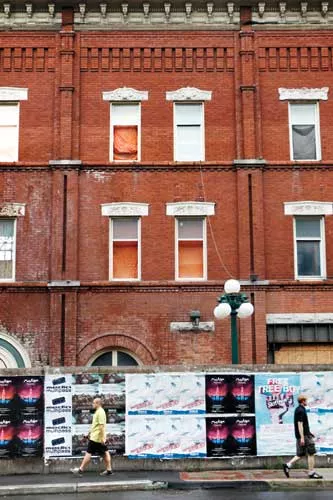How Somerset House Transformed From The Grande Dame Of Bank Street To A Blight On The Neighbourhood
Just 10 years ago, the Duke of Somerset and its downstairs neighbour, the Lockmaster Tavern, had the highest daily beer sales of any bar in the city. Today, the Bank Street landmark is an eyesore.
There is a piece of graffiti on Somerset House that shows a waif of a girl beneath a headline reading Unwanted. Whoever made the drawing certainly picked the right building. Located at the corner of Somerset and Bank streets, Somerset House was once home to such Ottawa landmarks as the Ritz Hotel and The Duke of Somerset, although the glory days of the building are rapidly becoming a dim memory.
Somerset House has now sat empty for nearly six years. For four of those years, it has been sheathed with metal scaffolding and exterior support beams, an ugly eyesore at one of the major intersections in the nation’s capital. “It is a shame what has happened to Somerset House,” says David Flemming, past president of Heritage Ottawa. “I can’t think of many cities that would allow a building to sit in such a state — just rotting away, really — at such a prominent location.”
How Somerset House was transformed from the grande dame of Bank Street to black-sheep blight on the neighbourhood is a convoluted tale of mishap and red tape, litigation and public policy, although a central character in the story — the noun that agrees with the active verb, if you will — has been the City of Ottawa. “The city bears most of the responsibility for what has happened to Somerset House,” says Derek Crain, president of the Somerset Village Business Improvement Area, as well as an architect who has been trying to restore the historic building. “The story of what has happened to Somerset House in the past four years,” says Crain, “the way the owner has been treated, what this community has gone through — it is unlike anything I have seen in the nearly 37 years I have been working in this city.”
Somerset House was built in 1896, a three-storey, red-brick building erected at the corner of Bank and Somerset. Many of the buildings in Somerset Village were built around the same time — between 1890 and 1900 — and walking the tree-lined streets in the area is like being transported back to the late-Victorian age.
Even back then, Somerset House was meant to be a showpiece for the neighbourhood. It had a tin cornice and cast-iron columns on the Bank Street facade. It had pre-cast trim and brick detailing. It was built to house Crosby Brothers Dry Goods, one of the largest department stores in the city at the time. In 1902, a four-storey apartment building was added to the rear of the building. And in 1936, the building was purchased by C.W. Mitchell, one of the founders of the Ottawa Free Press, the forerunner to the Ottawa Journal. It was Mitchell and his son Edgar who turned Somerset House into an Ottawa landmark, the result of their decision to shut down the current business in the building — a dance studio — and open a hotel.
The Ritz Hotel became one of Ottawa’s legendary watering holes, an establishment that helped make Bank Street the place to go in the ’40s, ’50s, and ’60s. Down the Bank Street strip, along with the Ritz, there was the Alexandria Hotel and the Gilmour Hotel, as well as such theatres as the Imperial, the Rialto, and the Capital, which was the largest theatre ever built in Ottawa. Bank Street was the hub of Ottawa’s social scene, and the grandson and namesake of Edgar Mitchell remembers it well. “I grew up in the Ritz Hotel,” says Edgar Mitchell. “It was packed every afternoon, every night. Bank Street was so alive back then. It was the place everybody came.”
In the early ’70s — to compete with emerging entertainment destinations like Elgin Street and the ByWard Market — Mitchell changed the name of the Ritz Hotel back to Somerset House and opened a jazz club in the basement, called C.W.’s. A few years later C.W.’s became the Duke of Somerset and the upstairs room became the Lockmaster Tavern. Despite the name changes, people for many years insisted on calling it the Ritz.
The confusion didn’t hurt business. Ten years ago the Duke of Somerset and the Lockmaster Tavern, combined, had higher daily beer sales than any other single-address drinking establishment in the city, with the exception of Scotiabank Place on a Senators game night. Mitchell remembers looking forward to becoming an old, grey-haired publican, a man who would work behind the bar only occasionally so that he could be teased by the old-timers. The rest of the work — the hard toil of actually running a successful bar and tavern — he would leave to his son.
Then, in the spring of 2000, Ottawa city council passed a bylaw — one that on the surface would seem to have nothing to do with heritage but that started the slow decline of Somerset House.
